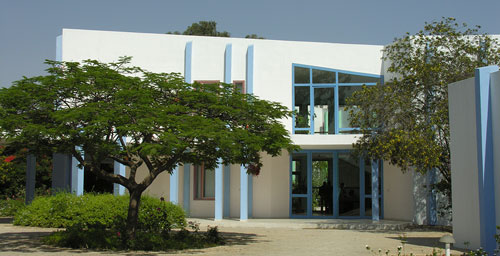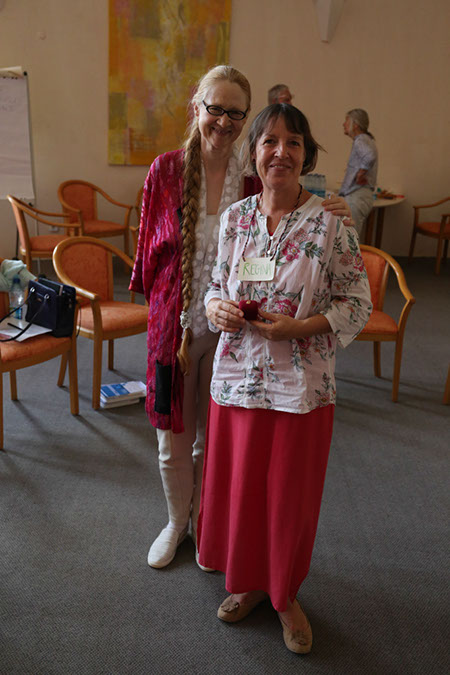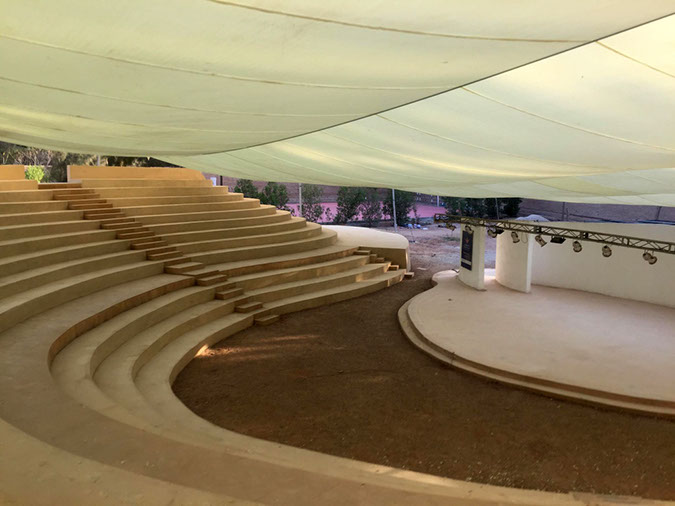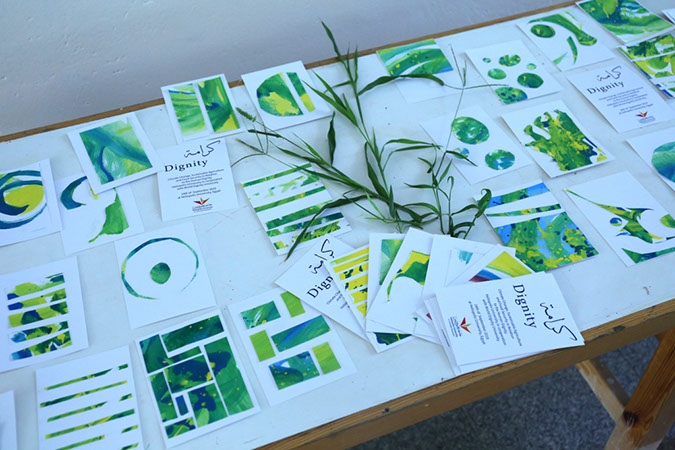31st Annual Conference of Human Dignity and Humiliation Studies
'Dignity and Innovation – Strategies for a Sustainable Future,
with a Special Focus on Agriculture and Water'
in Cairo, Egypt
21st - 24th September 2018
'Dignity is a result of love coming from peace like water comes from water springs'
Please see Newsletter 31, written after this conference — you are always warmly invited to contribute to it! (Just send your comments to us so that we can include them in the newsletter.)
Please see a short programme of the entire conference, the programme of the Public Event only, and highlights of the Workshop Part (see it also as Pdf), and of the Public Event (see as Pdf), and see the post-conference Dignity Letter of 15th October 2018
See also two invitations prior to this conference, from 2nd February 2018 and from 15h June 2018. See also a little video invitation.
There are no registration fees for our conferences, we usally share cost according to ability. We thank all participants of this conference for paying for their own travels and housing, and we most warmly thank SEKEM for offering a wonderful venue, and delicious food.
If you wish to participate in our future conferences, please email us. Please know that you are always invited to spend the entire conference with us, so that real dignity-family-building can emerge. All our events are part of an ongoing effort to nurture a global dignity community.
For all our conferences, you are invited to fill out our Appreciative Introduction form, print it out, and bring it with you.
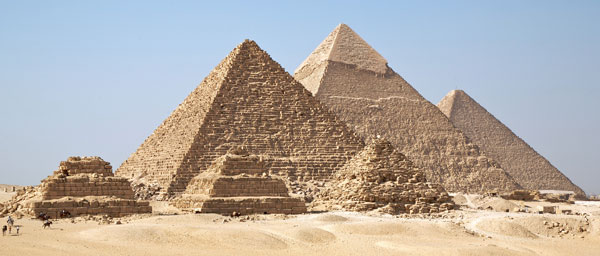
The Gizah Pyramids (by Ricardo Liberato)
The conference had two parts, a workshop part and a public part
Workshop with Dignilogues
21st - 23rd September, registration 21st September, 10.00
Programme
Location: SEKEM Farm - 40 Years of Sustainable Development, Ecovillage, Belbeis, Ard El-Katiba, Galvina - SEKEM, El Sharkia (1 hour from Cairo airport, location on google map: https://goo.gl/maps/UHHReUYvkzD2)
Together, we examined the link between dignity and innovation and how strategies for a sustainable future can be found, strategies for the unfolding of dignity for all throughout the world. For Egypt, the special focus was on agriculture and water, a focus that is highly relevant also for the rest of the world.
Public Event
24th September, 9.30 - 14.00
Programme
Location: Ibn Rushd Hall, Heliopolis University for Sustainability, 3 Cairo Belbeis Desert Road, El-Nahda, El Salam City/Qism El-Salam, Heliopolis, Cairo (20 minutes from Cairo airport, for google map search, just search for Heliopolis University)
طريق القاهرة - بلبيس الصحراوى، النهضة، قسم السلام، محافظة القاهرة3
Post-Conference Activities for Those Interested
Lisbeth Vilkan Glad kindly invited all to join her and her husband to travel to their home in the extraordinary oasis Siwa after the conference. Read more about their home in Siwa here.
Apart from that, if you had not yet been in Cairo, you could visit the Pyramids of Gizeh, Saqqara, the Egyptian Museum, Khan el-Khalili, and the many other important sites in Cairo and Egypt.
Local Hosts, Organisers, and Conveners
Ragnhild Nilsen, SEKEM Scandinavia

and Evelin LindnerSEKEM - 40 Years of Sustainable Development
Sekem is the ancient Egyptian hieroglyph for vitality, the wheel of balance
Partners
The conference was arranged cooperatively by SEKEM Ecovillage and Heliopolis University for Sustainability in Cairo, Human Dignity and Humiliation Studies (HumanDHS), and the World Dignity University initiative, together with Innolab, Sea Direction, and Nortura, Norway.
Heliopolis University has been created by SEKEM, founded by Dr. Ibrahim Abouleish,
now carried into the future by his son Helmy Abouleish, Chair of the Board of Trustees of Heliopolis University, together with his wife Konstanze and the entire SEKEM team and the faculty of the Heliopolis University.
See The History of SEKEM, a short overview video over the history of SEKEM created by Evelin Lindner after the conference from various sources.
Venue of the Public Event of the conference in Heliopolis University of Sustainability

Venue of the Workshop Part of the conference in the guesthouse at the SEKEM main farm (click here to see more photos)
Group photos Day Two
Group photo Day Three

Group photo Day Four
• If you wish to participate in our conferences, please send us an email!
• There is no registration fee for our conferences. To cover our expenses, we always summarise the costs during the conference and invite participants to contribute according to their ability. This collaborative approach to financing allows us to keep the conference affordable for all.
• See here the Appreciative Introduction template for participants to fill in, print out, and bring to our conferences: Word / Pdf.
• Please see here an invitation to this conference from 2nd February 2018, and from 15h June 2018.• Please see here a video invitation by Evelin Lindner recorded in Cairo on 15th August 2018.
• See here a short programme of the entire conference for print-out, and a separate programme for the Public Event. See highlights of the Workshop Part (see it also as Pdf), and of the Public Event (see as Pdf).
• Have a look at all our previous conferences and see also our Newsletters, written after our past conferences.
• How to reach the two venues for this conference
You were invited to fly to Cairo, Egypt. These were the two conference venues:
1. SEKEM Farm - 40 Years of Sustainable Development, Ecovillage, Belbes, Ard El-Katiba, Galvina - SEKEM, El Sharkia (1 hour from Cairo airport, location on google map: https://goo.gl/maps/UHHReUYvkzD2)
2. Heliopolis University, 3 Cairo - Belbeis Desert Road, El-Nahda, Qism El-Salam (20 minutes from Cairo airport), طريق القاهرة - بلبيس الصحراوى، النهضة، قسم السلام، محافظة القاهرة3
For google map search just enter Heliopolis University.
See also SEKEM News, see, among others, SEKEM News: The Future of the Organic Sector and Our Earth, and the Sekem Sustainability Report 2017, and a summary of the highlights of the conference.
• Where we could eat and what to do
We were able to eat at the conference venues. Both venues are wonderful places, where everybody can relax and enjoy.
• Where to stay
Every participant was welcome to stay at the SEKEM Ecovillage throughout the conference, an hour's drive north-east from Cairo. The workshop part of the conference took place at SEKEM, while the Public Event was conducted at Heliopolis University. This university has been created by SEKEM, founded by Dr. Ibrahim Abouleish.
For those coming from Cairo to SEKEM for the first three conference days, Uber was recommended to be a good solution.
For the Public Event, collective transport was organised from and to SEKEM.
Everybody who wished to stay in the SEKEM guest house, could make a reservation via the link www.sekem.com/en/contact/visit-sekem/. See the flyer of the guest house and a price list.
Sekem guest house also arranges for airport transfers.
For people who were looking for cheaper accommodation at SEKEM, SEKEM also offered the possibility to have accommodation at the Palm House on the SEKEM Farm, ca. a 10 minutes walk away from the guesthouse, at a reduced price of 600 LE per night. The Palm House has 2 floors and 10 rooms with different capacities: 4 double rooms 3 triple rooms 3 rooms, each for 5 persons. Only one room in the upper floor includes a bathroom. Apart from that there are 4 other separate bathrooms in the upper floor that can be shared by the guests. In the ground floor there is another separate shareable bathroom. The rooms are simply equipped and do not have air condition. Food was being served for all participants either in the restaurant of the guesthouse or in the cafeteria for the management.
Participants could also find a place to stay in Heliopolis if they wished so.
Message to participants living in Cairo: Since all participants in our conferences are fully responsible for bearing the cost of their own travel, transportation, and accommodation arrangements, we always kindly ask local participants who reside in close proximity of the conference venue to lend a helping hand to those traveling from afar, which also helps us keep our events collaborative and affordable for all.
• Possible post-conference experiences
Lisbeth Vilkan Glad kindly invited all who might be interested to join her and her husband to travel to their home in the extraordinary oasis Siwa afteer the conference. Read more about their home in Siwa here.
Apart from that, clearly, everybody could visit the Pyramids of Gizeh, Saqqara, the Egyptian Museum, Khan el-Khalili, and the many other important sites in Cairo and Egypt.
• Please kindly note that...
• There is no registration fee for our conferences. To cover our expenses, we always summarise the costs during the conference and invite participants to contribute according to their ability. This collaborative approach to financing allows us to keep the conference affordable for all.
• We like to get to know participants prior to our conferences and workshops, and prior to issuing an invitation.
• All our gatherings are by invitation only, please approach us so that we can include you and register you.
Only our Public Events are open to everybody without registration.
• The Non-Public Parts of our gatherings have limited enrolment.
• Participants are encouraged to find their own sources of funding or economic support to participate in our conferences. We offer our nurturing work as our gift of love and care to you, and we
would like to lovingly invite everybody to contribute to this gift economy. If you need funding for your travels and housing, please use the invitation letter we send you and inquire in your country and your university about possibilities. See, among others, for the U.S., www.supportcenter.org and www.foundationscenter.org. The Weinstein International Fellowship program, inaugurated in 2008, provides opportunities for individuals from outside the United States to visit the U.S. to learn more about dispute resolution processes and practices and to pursue a project of their own design that serves to advance the resolution of disputes in their home countries.
• Participants in our conferences are kindly asked to handle all of their travel arrangements and required documentation, including requests for visas, on their side. HumanDHS is a volunteer initiative and does not have the staff or resources to assist with visa requests.
• Permissions
During our conferences, we always ask all participants for their permission to have their pictures or videos posted on our website, however, if you change your mind later, either in total or for specific pictures/videos, please let us know! Thank you! Since we wish to walk the talk of dignity, it is very important for us to do our utmost in respecting everybody's privacy. We refrain from gathering written permissions from participants during our conferences since we value the creation of mutual trust in relationships and would like to refrain from contributing to an ever more bureaucratic and legalistic society.
• Green conference and reinventing organization
We strive to organise our conferences as "Green Conferences". Lynn King kindly advises us. We also thank Vegard Jordanger for making us aware of Frederic Laloux's work on Reinventing Organizations (2014).
• What happened in our previous conferences?
Please have a look at all our previous conferences and the newsletters written after these conferences.
• Frame
• List of Conveners
• Programme
• List of Participants
• Papers
• Background Material
• Previous Reflections on the Format of the Conference
• Pictures and videos
Still pictures:
Day One, 21st September 2018
• Please click here to see the pictures taken by Effat Yehia with Lisbeth Glad's camera
• Please click here to see the photos from Lisbeth Glad's mobile phone
• Please click here to see the photos Sameh Khouzam took with his mobile phone
• Please click here to see photos of Mary Bakhoum and Sameh Khouzam
• Please click here to see photos of Moustafa Hedayah
Day Two, 22nd September 2018
• Please click here to see the pictures taken by Narimeh Paeplow
• Please click here to see the photos of how compost is being made
• Please click here to see the pictures taken by Noha Hussein
• Please click here to see photos of the visit to the memorial of Ibrahim Abouleish
• Please click here to see photos of the evening gathering
Day Three, Sunday, 23rd September 2018
• Please click here to see the pictures taken by Evelin Lindner
• Please click here to see the pictures taken by Lisbeth Glad
• Please click here to see the pictures taken by Noha Hussein
Day Four, Monday, 24th September 2018
• Please click here to see the pictures taken by Lisbeth Glad
• Please click here to see the pictures taken by Sameh Khouzam
• Please click here to see the pictures taken by Sameh Khouzam of a tour through Heliopolis University
• Please click here to see the pictures taken by Narimeh Paeplow
All of the conference
• Please click here to see the venues of this conference
• Please click here to see the programme for the entire conference that we created together on Day One, and the Dignilogue posters
• Please click here to see a collection of portrait photos
• Please click here to see photos of Helmy Abouleish
• Please click here to see photos of Evelin LindnerVideos
Thank you so much, dear Linda Kabaira and many others, for creating many wonderful video-recordings!
• 00 The History of SEKEM (a short overview over the history of SEKEM created by Evelin Lindner from various sources)
'Messages to the World' for the World Dignity University initiative:
Day One, 21st September 2018
• 32 WDU Message: Ragnhild Nilsen and Helmy Abouleish (Version edited by Effat Yehia)
Day Two, 22nd September 2018
• 37 WDU Message: Ute Meinel and Kees Hulsman
• 38 WDU Message: Zaynab El Bernoussi and Linda Kabaira
Day Three, 23rd September 2018
• 39 WDU Message: Linda Kabaira and Maya von Maltzan
• 40 WDU Message: Ragnhild Nilsen and Evelin Lindner
Documentation of the Entire Conference:
Day One
• 01.0 The SEKEM Choir Welcomed All Participants, recorded by Sameh Khouzam
• 01.1 The SEKEM Choir Welcomed All Participants
• 02 Ragnhild Nilsen Sang a Thank You, recorded by Sameh Khouzam
• 03 Lisbeth Glad, Mary Bakhoum, and Sameh Khouzam
• 04 Welcome by Evelin Lindner, HumanDHS and World Dignity University Initiative (see Powerpoint)
• 05 Welcome (online) by Linda Hartling, Director of Human Dignity and Humiliation Studies
• 06 Keynote: Helmy Abouleish Presented SEKEM’s Vision and Mission 2057
• 07 The Sekem Mission Interpreted by Sameh Khouzam After Helmy's talk
Participants Presented Each Other
• 08 Regina Hanel and Lilli Pohl
• 09 Linda Kabaira and Sameh Khouzam
• 10 Gerdelin Bodvin and Martina
• 11 Zaynab El Bernoussi and Kees Hulsman
• 12 Moustafa Hedayah and Per Glad
• 13 Lisbeth Vilkan Glad and Mary Bakhoum
• 14 Konstanze Abouleish and Evelin Lindner
• 15 Effat Yehia and Tanja Sophia Rüter
• 16 Ute Meinel and Maya von Maltzan
• 17 John A. Shoup and Ragnhild Nilsen
• 18 Ragnhild Nilsen and Evelin Lindner
• 19 Ragnhild Nilsen Sang in Honour of Helmy Abouleish and His Dignity Work
Participants Explained Their Dignilogue Topics
• 20 Ute Meinert
• 21 Lilli Pohl
• 22 Helmy Abouleish
• 23 Linda Kabaira
• 24 Regina Hanel
• 25 Effat Yehia
• 26 Zaynab El Bernoussi
• 27 Collaborative Creation of the Schedule of the Workshop
• 28 Evelin Lindner Explained the 'Messages to the World' for the World Dignity University Initiative
• 29 Dignilogue by Helmy Abouleish and Ragnhild Nilsen
• 30 Konstanze Abouleish's Reflections After the Dignilogue
• 31 Ragnhild Nilsen's Reflections After the Dignilogue
• 32 WDU Message: Ragnhild Nilsen and Helmy Abouleish (version edited by Effat Yehia)
• 33 Circle of Love Gifts
Day Two, 22nd September 2018
• 34 Magdy Ahmed Mohamed Gave the Gift of His Music
• 35.0 Dignilogue by Evelin Lindner (version recorded by Narimeh Paeplow)
• 35.1 Dignilogue by Evelin Lindner
• 36 Dialogue After Evelin Lindner's Dignilogue
• 37 WDU Message: Ute Meinel and Kees Hulsman
• 38 WDU Message: Zaynab El Bernoussi and Linda Kabaira
Day Three, 23rd September 2018
• 39 WDU Message: Linda Kabaira and Maya von Maltzan
• 40 WDU Message: Ragnhild Nilsen and Evelin Lindner
• 41 The Children of SEKEM Sang Biladi (My Homeland)
• What happened in our previous meetings? Please see Newsletters!
Frame
by Linda Hartling, 2004
In our meetings we aim at creating a humiliation-free, collaborative learning environment characterised by mutual respect, mutual empathy, and openness to difference. The perspective of 'appreciative enquiry' is a useful frame of our work. Our HumanDHS efforts are not just about the work we do together, but also about HOW WE WORK TOGETHER. At appropriate points during our meetings, for example at the end of each day, we take a moment to reflect on the practices observed that contributed to an appreciative/humiliation-free learning experience.
It is important to emphasise that an appreciative approach is not about expecting people to agree. In fact, differences of opinion enrich the conversation and deepen people's understanding of ideas. Perhaps, this could be conceptualised as 'waging good conflict' (Jean Baker Miller), which means practicing radical respect for differences and being open to a variety of perspectives and engaging others without contempt or rankism. As we have seen in many fields, contempt and rankism drain energy away from the important work that needs to be done. Most people only know 'conflict' as a form of war within a win/lose frame. 'Waging good conflict', on the other side, is about being empathic and respectful, making room for authenticity, creating clarity, and growth.
Please see:
• An Appreciative Frame: Beginning a Dialogue on Human Dignity and Humiliation, written by Linda in 2005
• Appreciative Facilitation: Hints for Round Table Moderators, kindly written in February 2006 by Judith Thompson to support the moderators of our workshops.
• Buddhist Teachings on Right Speech, kindly provided to us by Thomas Daffern in 2006, relating to our quest for appreciative enquiry, caring and being.
• Please see also these videos on our Appreciative Frame, created by Linda Hartling:
- Appreciative Enquiry 1, a video that was recorded on October 30, 2011, in Portland, Oregon, USA, by Evelin Lindner, for the World Dignity University initiative.
- Appreciative Enquiry 2, a video that was uploaded onto YouTube on August 11, 2012, in preparation of the 19th Annual Conference of Human Dignity and Humiliation Studies, 27th-30th August 2012, in Oslo, Norway.
- Our Appreciative Frame 3, a video created in December 2014 (see also Pdf), for the 2014 Workshop on Transforming Humiliation and Violent Conflict, in New York City, December 4–5, 2014.
- Appreciative Enquiry 4, a video that was recorded on May 27, 2015, in Portland, Oregon, USA, by Linda Hartling, for the 25th Annual Conference of Human Dignity and Humiliation Studies, in Kigali, Rwanda, 2nd - 5th June 2015.
- Appreciative Frame, by Linda Hartling on December 8, 2016, at the 2016 Workshop on Transforming Humiliation and Violent Conflict, in New York City, December 8 – 9, 2016.
• Dignilogue Tips and Dynamic Dignilogue List, created by Linda Hartling on October 10, 2015, for the 2015 Workshop on Transforming Humiliation and Violent Conflict, in New York City, December 3 – 4, 2015.
List of Conveners
Evelin Gerda Lindner, Medical Doctor, Clinical and Social Psychologist, Ph.D. (Dr. med.), Ph.D. (Dr. psychol.), Organiser of the HumanDHS Conferences, Supporting the Local Conveners
Evelin Gerda Lindner is the Founding President of the Human Dignity and Humiliation Studies (HumanDHS) network and initiator of the World Dignity University initiative. She is a transdisciplinary social scientist and humanist who holds two Ph.D.s, one in medicine and one in psychology. In 1996, she designed a research project on the concept of humiliation and its role in genocide and war. German history served as starting point. She is the recipient of the 2006 SBAP Award, the 2009 "Prisoner’s Testament" Peace Award, the 2014 HumanDHS Lifetime Award, and she has been nominated for the Nobel Peace Prize in 2015, 2016, and 2017. She is affiliated with the University of Oslo, Norway, with its Centre for Gender Research, and with its Department of Psychology (folk.uio.no/evelinl/), furthermore, with the Columbia University Conflict Resolution Network (CU-CRN), which was superseded, in 2009, by the Advanced Consortium on Cooperation, Conflict, and Complexity (AC4) at Columbia University, New York. She is also affiliated with the Maison des Sciences de l'Homme in Paris. Lindner is teaching globally, including in South East Asia, the Middle East, Australia, Africa, and other places globally. [read more]
Please see:
• Interview with Evelin Lindner - Challenges of our Time; Learning to Connect, December 8, 2016
• Mini-Documentary of the Annual Human Dignity and Humiliation Studies Workshop on Transforming Humiliation and Violent Conflict "The Globalization of Dignity," December 8 - 9, 2016
Linda Hartling, Ph.D., Social Psychologist, Organiser of the HumanDHS Conferences, Supporting the Local Conveners
Dr. Linda M. Hartling is the Director of Human Dignity and Humiliation Studies (HumanDHS). She is also a Member of the HumanDHS Global Advisory Board, HumanDHS Global Core Team, HumanDHS Global Coordinating Team, HumanDHS Research Team, and HumanDHS Education Team. She is the Editor of the Journal of Human Dignity and Humiliation Studies (JHDHS).
Hartling is affiliated with the Jean Baker Miller Training Institute (JBMTI) at the Stone Center, which is part of the Wellesley Centers for Women at Wellesley College in Massachusetts.
Until November 2008, she was its Associate Director. Hartling is a member of the JBMTI theory-building group advancing the practice of the Relational-Cultural Theory, which is a new model of psychological development. In addition, Hartling coordinates and contributes to training programs, publications, and special projects for the JBMTI. She holds a doctoral degree in clinical/community psychology and has published papers on resilience, substance abuse prevention, shame and humiliation, relational practice in the workplace, and Relational-Cultural Theory. [read more]
Please see:
• Humiliation: Real Pain, A Pathway to Violence, the draft of Linda's paper for Round Table 2 of our 2005 Workshop on Humiliation and Violent Conflict, Columbia University, New York.
• Humiliation: Assessing the Impact of Derision, Degradation, and Debasement, first published in The Journal of Primary Prevention, 19(4): 259-278, co-authored with T. Luchetta, 1999.
• Shame and Humiliation: From Isolation to Relational Transformation, the Jean Baker Miller Training Institute (JBMIT), Wellesley Centers for Women, Wellesley College No. 88, Wellesley, MA 02481, co-authored with Wendy Rosen, Maureen Walker, Judith V. Jordan, 2000.
• Humiliation and Assistance: Telling the Truth About Power, Telling a New Story, paper prepared for the 5th Annual Conference of Human Dignity and Humiliation Studies 'Beyond Humiliation: Encouraging Human Dignity in the Lives and Work of All People', in Berlin, 15th -17th September, 2005.
• Mini-Documentary of the Annual Human Dignity and Humiliation Studies Workshop on Transforming Humiliation and Violent Conflict "The Globalization of Dignity," December 8 - 9, 2016
Ragnhild Nilsen, Host, Organiser, and Convener
Ragnhild Nilsen is a global change agent. She is Arctic Queen, an artist who uses her voice for global transformation. As a singer, she draws on the tradition of yoik, chanting, and improvisation. She is also reckoned as one of Scandinavia's most skilled public speakers and lecturers in the field of transformation and is a sought-after coach and communication artist. Furthermore, Ragnhild is the author of several books, both fiction and non-fiction. As a writer, she works within the genre of "faction" and intertwines academic knowledge with poetic and practical approaches, within psychology, presentation skills, negotiation, and topics related to quality of life... As a social entrepreneur, she is the founder of Global Fair Trade and SEKEM Scandinavia. [read more]
Workshop Programme
Pre-conference activities

2nd September 2018: What a privilege to meet Regina Hanel for the first time in person, after two years of email contact! It was a joy to show her the 'circle of love gifts' and offer her the red scarf sent to her from Fanny Duckert of the University of Oslo in Norway!
• Please click on the picture above or here to see more photos.




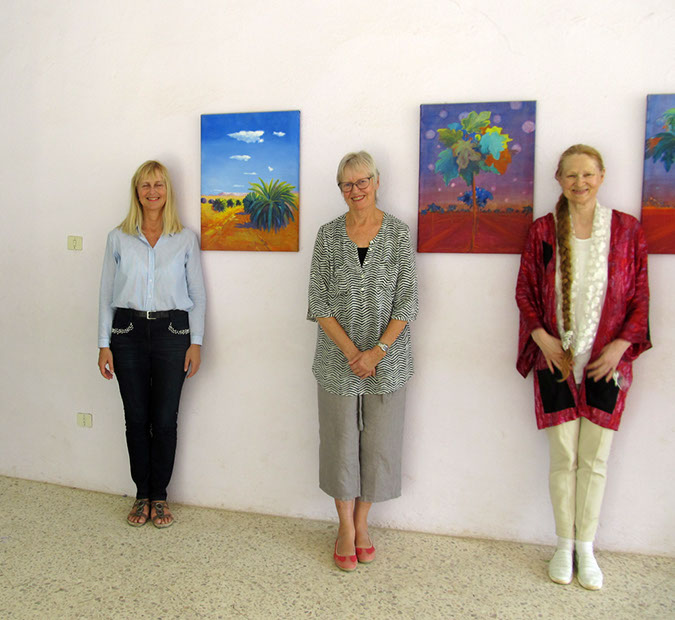


20th September 2018: Ragnhild Nilsen, Lisbeth and Per Glad, and Gerdelin Bodvin have arrived! We had breakfast, we made ourselves familiar with the conference venue, and we admired Lisbeth's paintings!
• Please click on the pictures above or here to see all the 81 photos that Gerdelin took with her camera.
Day One of the Workshop part of the conference, 21st September 2018
Location: SEKEM Farm - 40 Years of Sustainable Development, Ecovillage, Belbeis, Ard El-Katiba, Galvina - SEKEM, El Sharkia (1 hour from Cairo airport)
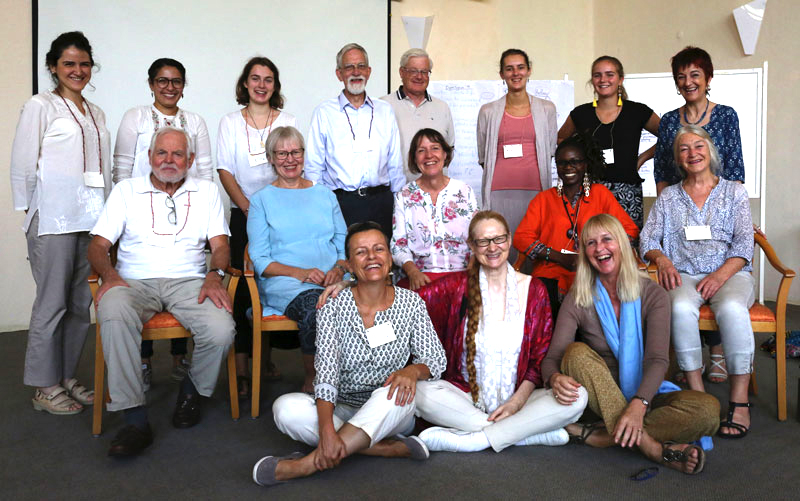

Web galleries of still photos of Day One:
• Please click here to see the pictures taken by Effat Yehia with Lisbeth Glad's camera
• Please click here to see the photos from Lisbeth Glad's mobile phone
• Please click here to see the photos Sameh Khouzam took with his mobile phone
• Please click here to see photos of Mary Bakhoum and Sameh Khouzam
• Please click here to see photos of Moustafa Hedayah
All of the conference
• Please click here to see the venues of this conference
• Please click here to see the programme for the entire conference that we created together on Day One, and the Dignilogue posters
• Please click here to see a collection of portrait photos
• Please click here to see photos of Helmy Abouleish
• Please click here to see photos of Evelin Lindner
Effat's photos

Thank you, dear Effat Yehia, for taking such lovely photos and editing them so beautifully!














Narimeh's photos

Thank you, dear Narimeh Paeplow, for taking such nice photos, including lovely portrait photos!

















• 10.00 Registration
Thank you so much, dearest Gerdelin Bodvin, for stepping up and being the guardian and nurturer of our registration table!
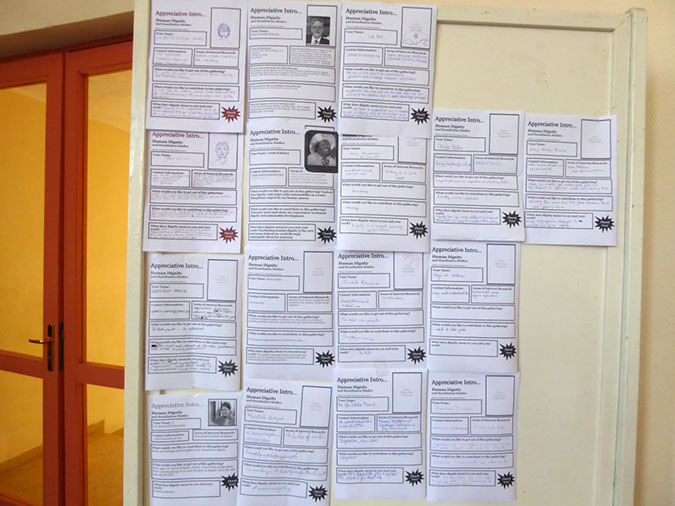














For all our conferences, our participants are invited to fill out our Appreciative Introduction form, print it out, and bring it with them.
Conference Opening: The SEKEM Choir welcomed all participants (Video of the choir | Video of the choir recorded by Sameh Khouzam | Video of Ragnhild Nilsen's thank-you song)
• Lisbeth Glad, Mary Bakhoum, and Sameh Khouzam filled out their Appreciative Introduction
• Welcome by Ragnhild Nilsen of SEKEM Scandinavia
• Welcome to Human Dignity and Humiliation Studies and the World Dignity University Initiative by Evelin Lindner (see Video | Powerpoint)
• Welcome (online) by Linda Hartling, Director of Human Dignity and Humiliation Studies, Portland, Oregon (2 minutes, see also a 7 minutes greeting from 2015, and a Pdf from 2014)
Linda M. Hartling, Ph.D., Director of the Human Dignity and Humiliation Studies network. Linda is also affiliated with the Jean Baker Miller Training Institute (JBMTI) at the Stone Center, which is part of the Wellesley Centers for Women at Wellesley College in Massachusetts. Until 2008, she was its Associate Director.
Linda usually sets the frame of our workshops and conferences within "Appreciative Enquiry" that takes the best from the concept of debate, and dignifies it by placing relationships first. We create a list of agreed upon norms having to do with the nature and tone of our dialogue.
It is important to note that our appreciative frame is a HumanDHS-defined version of AI. We emphasize "waging good conflict" (Jean Baker Miller). We believe that diverging opinions and perspectives need to be expressed and not avoided, because diversity enriches. However, diversity only enriches if embedded into mutual connection and appreciation. If not harnessed lovingly and caringly, diversity has the potential to humiliate, divide, create hostility, foster hatred, and even violence. In the spirit of our vision, we, the HumanDHS network, wish therefore to avoid the latter, and instead open a space of common ground and mutually caring connections, a space for the safe expression of even the deepest differences and disagreements, and the toughest issues of humiliation, trauma, and injustice to be aired safely.
Also created by Linda M. Hartling:
• Appreciative Enquiry 4, recorded on 27th May 2015, for our 2015 Kigali Conference
• Our Appreciative Frame, created in December 2014 for our 2014 New York Workshop (Pdf)
• Our Appreciative Frame, created on 12th August 2012 for our 2012 Norway Conference
• Welcome by Helmy Abouleish, as representative of the host SEKEM and Heliopolis University for Sustainability (see Video | Powerpoint | SEKEM Vision and Mission 2057: 1977 – 2017 – 2057)



• Please click here to see more photos of Helmy Abouleish
Helmy Abouleish is Chief Executive Officer of SEKEM Holding that consists of five companies (ISIS Organic, ATOS Pharma, NatureTex, Lotus and SEKEM for Land Reclamation), which cover the fields of Biodynamic agriculture cultivation, production of phyto-pharmaceuticals, Organic textiles and foodstuffs, with a capacity of 1600 people. He is also the President of Demeter. See the SEKEM Vision and Mission 2057: 1977 – 2017 – 2057.
The Sekem mission interpreted by Sameh Khouzam after Helmy's talk (Video)



Inspired by the talk given by Helmy Abouleish on 21st September 2018, Sameh Khouzam created a visual conceptualisation that makes visible many elements of the mission of SEKEM. Sameh combines symbols from Pharaonic times together with symbolic expressions that he creates himself. This drawing now waits for an artist to turn it into a final form.
Still photos of Day One:
• Please click here to see the pictures taken by Effat Yehia with Lisbeth Glad's camera
• Please click here to see the photos from Lisbeth Glad's mobile phone
• Please click here to see the photos Sameh Khouzam took with his mobile phone
• Please click here to see photos of Mary Bakhoum and Sameh Khouzam
• Please click here to see photos of Moustafa Hedayah
All of the conference
• Please click here to see the venues of this conference
• Please click here to see the programme for the entire conference that we created together on Day One, and the Dignilogue posters
• Please click here to see a collection of portrait photos
• Please click here to see photos of Helmy Abouleish
• Please click here to see photos of Evelin Lindner
• Latest HumanDHS News
• Participants presented each other



• Please click here to see more photos of Mary Bakhoum and Sameh Khouzam

• Please click here to see more photos of Moustafa Hedayah• Regina Hanel and Lilli Pohl presented each other (Video)
• Linda Kabaira and Sameh Khouzam presented each other (Video)
• Gerdelin Bodvin and Martina presented each other (Video)
• Zaynab El Bernoussi and Kees Hulsman presented each other (Video)
• Moustafa Hedayah and Per Glad presented each other (Video)
• Lisbeth Vilkan Glad and Mary Bakhoum presented each other (Video)
• Konstanze Abouleish and Evelin Lindner presented each other (Video)
• Effat Yehia and Tanja Sophia Rüter presented each other (Video)
• Ute Meinel and Maya von Maltzan presented each other (Video)
• John A. Shoup and Ragnhild Nilsen presented each other (Video)
• Ragnhild Nilsen introduced Evelin Lindner (Video)
• Please click here to see more photos
• Ragnhild Nilsen sang in honour of Helmy Abouleish and his dignity work
• Launch of Dignilogue sessions
Introductions created by Linda M. Hartling:
• Dignilogue: An Introduction to Dignity + Dialogue created on 31th May 2015 (5 minutes)
• Introducing the Open Space Format to the HumanDHS Network, longer version created on 13th August 2012 (13 minutes)
• Dignilogue Tips and Dynamic Dignilogue List, created on 10th October 2015 for our 2015 New York Workshop
• Our Open Space Dignilogue Format, created on 12th August 2012 for our 2012 Norway Conference
• See also A Summary of Our Dignilogue Format created in 2010 for you to download
• See also Appreciative Facilitation: Hints for Dignilogue Moderators, written in February 2006 by Judith Thompson to support the Moderators of our workshops
• 13.00 - 14.00 Lunch
• Organising the Dignilogue sessions - Collaborative creation of the schedule of the workshop (Video)
For the past decade, we have continuously worked to dignify the traditional institution "conference." The Open Space movement originally started from the observation that after mainstream academic conferences, the participants often sigh: 'Oh, I slept through the presentations, but the coffee breaks were wonderful!' 'Conference programs are replete with monologues that silence all but the speaker. The vitalizing communication is typically found in the hallways, the bars, and the dinner table – the venues of informal conversation', wrote scholar Kenneth Gergen in 2009 (in his book on relational being). In other words, the motivating impetus behind the Open Space approach is that academic conference can be rather boring; invited speakers might not be in tune with the audience; and reading papers aloud may be particularly uncommunicative. The creators of the Open Space approach thought: 'Ok, why don't we create conferences that are structured like coffee breaks!' Please read more about the originator of the Open Space Technology, Harrison Owen. See also Open Space Tools by Peggy Holman.
In slight variation of traditional conferences, we therefore aim at co-creating our conferences. We have adapted the Open Space approach, added the term dialogue, and connected it with dignity to form the expression Dignilogue (see also our Video page for how peace linguist Francisco Gomes de Matos has inspired this linguistic creation). You can see an Introduction into the Dignilogue Sessions Format created by Linda M. Hartling on 12th August 2012, for our 2012 Norway Conference, or read more about the Dignilogue format and what it entails. See also Linda's Dignilogue Tips and Dynamic Dignilogue List, created on 10th October 2015 for the 2015 Workshop on Transforming Humiliation and Violent Conflict at Columbia University in New York City.
This format is very open, it means that a conference is self-organizing. We take a highly collaborative approach to determining how to use our time. We invite participants to be with us without the ambition to "present" something, so that we all could get a feel for the dignity-family-building work that we wish to nurture first and foremost. So, the workshop requires its participants to bring themselves as they are, be prepared for everything, and use the flow to contribute in the most nurturing way they can. As background reading you might enjoy "Are College Lectures Unfair?" by Anne Murphy Paul, The New York Times, September 12, 2015, or "When Nothing Is Cool," by Lisa Ruddick, in Criticism, 2015.
The Dignilogue approach allows for identifying priorities for dialogue sessions on key topics. In practice, on Day One of our conference, we, the participants, make the programme for Day Two and Day Three together, in a collaborative effort. All participants are both presenters and audience, there is no separation, there is no pre-planned programme, except for the introductory part (and the Public Event). We are aware that this approach is new to most people, yet, it opens new dimensions. We invite every participant to join in and try. It has an profoundly dignifying impact and, as our participants always tell us afterwards.
The grand finale of each Dignilogue session is to invite representatives from each Dignilogue to create a Dignivideo, where they document the highlights of their conversation and insights, and more than that, formulate a "message to the world" as it has crystallised in the dignilogue. These videos are treasured contributions to our World Dignity University Library of Ideas that will be shared with the world and will inspire future generations of our community. Please read about the way we work in our newsletter10.
There are two main ways to conduct our WDU videos:
1. Each group can choose two representatives (usually the initiator chooses one participant in the group) and they engage in a short dialogue (example). Advantage: the message may be clearer.
2. The entire group can stand in front of the camera (example). Advantage: everybody is being included.
Evelin Lindner explained the procedure of the 'Messages to the World' for the World Dignity University Initiative (see video).
We always encourage all participants of our events to nurture mutually dignifying connections with the other participants and gather together afterwards to experiment with new forms of "conferencing" wherever you live in the world. New solutions are necessary and they need to be nurtured in dignified ways, ways which protect them from being destroyed by being framed in old paradigms (such as those of protest that simply ends in new dominators taking over). See our reflections on appreciative nurturing, or Charles Eisenstein's Reflections on the New Story Summit, or Evelin's text Is it Possible to "Change the World"? Some Guidelines to How We Can Build a More Decent and Dignified World Effectively: The Case of Dignifying Abusers.
Participants explained their Dignilogue topics
• Ute Meinert
• Lilli Pohl
• Helmy Abouleish
• Linda Kabaira
• Regina Hanel
• Effat Yehia
• Zaynab El Bernoussi
• Dignilogue 1, Day One: Matter and Mind by Helmy Abouleish and Ragnhild Nilsen (Video)

• Please click here to see the programme for the entire conference that we created together on Day One, and the Dignilogue posters• Konstanze Abouleish's reflections after the Dignilogue
• Ragnhild Nilsen's reflections after the Dignilogue'Message to the World' for the World Dignity University (WDU) Initiative, Helmy Abouleish and Ragnhild Nilsen (Video 1 | Video 2 edited by Effat Yehia | SEKEM Vision and Mission 2057: 1977 – 2017 – 2057)
• Circle of Love Gifts (Video)
Evelin Lindner lives globally, and whenever she receives a gift in one part of the world, she takes it to another part of the world and looks for a worthy recipient for that gift. She calls this the 'circle of love gifts' (video). When she has found a worthy recipient, she tries to take a picture of this person wih the gift and sends it to the giver of the gift. In that way, not only is her global life a bridge-building endeavour, also the gifts that she carries help build more bridges.

• Please click on the photo on the left from Egypt to see it larger.
• Please click on the photo at the right to see more pictures from India.
The following dignilogue topics had been proposed during the two-years preparation period prior to the conference:
• Dignity Is a Result of Love Coming from Peace Like Water Comes from Water Springs
George Wagih Shawky, Pharmacist in 25, Gool Gamal, Cairo, 11th August 2018.
• SEKEM on the World Day to Combat Desertification: Sustainable Investment Worth It
This year, the World Day to Combat Desertification had the topic 'Land has true value – Invest in it'. It is a raised call from the United Nation Convention to Combat Desertification (UNCCD) to all involved parties, including worldwide decision makers, producers, and consumers, to support sustainable investments in the future of lands. The UNCCD emphasizes through this message that land is a worthy tangible asset beyond just monetary values. By sustainable green lands, job opportunities are created, food security is promoted and thereby peaceful, inclusive societies can develop.
SEKEM is combating desertification for more than 40 years. In 1977, the SEKEM founder Ibrahim Abouleish started to reclaim desert land in Egypt by Biodynamic agricultural methods and thereby laid the foundation for a sustainable community. He was convinced that soil embraces treasures.• The INDH (National Initiative for Human Dedvelopment) as Another Example of Participation in Development
John A. Shoup
John A. Shoup is a Full Professor of Anthropology has his BA and MA in Middle Eastern Studies/Arabic from the University of Utah and his PhD in Cultural Anthropology from Washington University in St. Louis. He has conducted field work in Lesotho, Jordan, Syria, Egypt, Tunisia, Morocco, and most recently in Mauritania on topics related to pastoralism, impact of tourism on local communities, traditional land use systems, and popular culture. He has authored and co-authored several articles and book chapters and published Culture and Customs of Jordan (2007), Culture and Customs of Syria (2008) and co-authored Saudi Arabia and Gulf Arab States Today: An Encyclopedia of Life the Arab States (2009), and Ethnicities in the Middle East and Africa (2012). He was part of research team for the Baseline Survey conducted in the Middle Atlas region of Ifrane (2000) and on the impact of tourism in Atlantic port city of Essaouira (2001- 2002) published as Assessing Tourism in Essaouira by Al Akhawayn University (2002). John Shoup taught at the American University in Cairo from 1990 to 1996 and at Al Akhawayn University in Ifrane, Morocco from 1996 to the present.
See for his publications, among others:
Shoup, John A. (2007). Culture and customs of Jordan. Westport, CT: Greenwood Press.
Shoup, John A. (2008). Culture and customs of Syria. Westport, CT: Greenwood Press.
Shoup, John A. (2011). Ethnic groups of Africa and the Middle East: An encyclopedia. Santa Barbara, CA: ABC-CLIO, 2011.
Shoup, John A. (2017). The Nile: An encyclopedia of geography, history, and culture. Santa Barbara, CA: ABC-CLIO, 2017.
Maisel, Sebastian, and John A. Shoup (2009). Saudi Arabia and the Gulf Arab states today: An encyclopedia of life in the Arab states. Westport, CT: Greenwood Press.• Global Dignity? Implications for Paradigms of International Development and Globalization
Zaynab El Bernoussi
Dr. Zaynab El Bernoussi is a professor of international studies at the School of Humanities and Social Sciences at Al Akhawayn University and a member of the Hillary Clinton Center for Women's Empowerment (HCC). She holds a PhD in political and social Sciences from the Université Catholique de Louvain. See her Appreciative Introduction.
Abstract: Last year’s meeting in New York City was about the planet, human greed, and dignity. One key takeaway for me was that in a planet in which materiality is essential as a tool of measuring progress, the issue is that we are depleting our resources and not necessarily increasing the quality of our lives. Maybe more of an illusion. This conference theme on strategies for a sustainable future with a special focus on agriculture and water could not have been more timely and the conference location could not have been more strategically set. Egypt is where the longest river in the world, the Nile, runs long and deep. Egypt has seen the building of an outstanding human civilization thanks to this very source of water. Therefore, it is very adequate to look at Egypt as a model for the rest of the world in which water issues are a huge threat and a key opportunity to progress further. [read more]
Please see also:
- Can Dignity Become a Constitutional Right? (Pdf | Video of Introduction | Video of Dignilogue Preparations | Lifestreaming by Bhante Revata Chipamong Chowdhury | Video of Summary) 2017
Contribution shared at the 2017 Workshop on Transforming Humiliation and Violent Conflict, Columbia University, New York City, December 7-8, 2017. Please see her Appreciative Introduction 2017 and see also Visiting Scholar Sheds New Light on Concepts of Dignity. Please see also her Appreciative Introduction 2017 and see also Visiting Scholar Sheds New Light on Concepts of Dignity.• Dignity and Political Modernisation in Tribal Societies (tentative title)
Khaled Fattah
In addition to a number of post graduate studies in the fields of intercultural communication, cultural psychology and development studies, Dr. Fattah holds a PhD in international relations from the University of St Andrews in the UK. His forthcoming academic works are entitled 'Political Modernization in Tribal Middle Eastern Societies' and 'Tribes and Revolutions in the Middle East'.• Wings of Peace and Shadows of War
Manfred Prinz
Prof. Dr. Manfred Prinz is working in the field of Cultural Studies and Intercultural Learning at the Institut für Romanistik der Justus-Liebig-Universität Gießen. In his contribution, he would like to show how labelling human beings can ultimately lead to war.• The Colombia Peace Process as a Process for Dignity and Recognition: A Model to Follow Up
Alicia Cabezudo is a Professor and Peace / Human Rights Educator and Consultant. Until recently, she was the Director of Educating Cities Latin America (International Relations Bureau, Municipality of Rosario, Argentina). The issue of humiliation is of deep concern to her because of the sufferings in the Latin-American region through dictatorship and torture. [read more]
- Profesora Alicia Cabezudo Escuela de Ciencias de la Educación Universidad Nacional de Rosario - UNR Rosario / Argentina
- International Peace Bureau - IPB Berlin
Alicia wrote on 20th June 2018:
The Colombia Peace Process is a model to follow up as a process for dignity and recognition of plural identities of war victims by the implementation of the peace agreements - as they give hope, recognition, citizenship rights, land and education. I believe this theme - on the recognition of dignity to populations from conflict areas or post conflict areas - most of them becoming refugees in the whole world - is relevant indeed towards creation of a real change and transformation, in terms of our dear friend Howard Richards. The role of Citizenship Education, Human Rights Education and construction of Culture of Peace - working with this kind of population - is one of the big challenges of actual Pedagogy in formal and non formal sites.• Sustainable Development in Bangladesh and its Challenges
Mohammad Abul Kalam Azad is Assistant Professor in General Education and Assistant Adviser for Student's Welfare at Manrat International University in Bangladesh. He has completed his M.A. degree in Peace Education at the United Nations mandated University for Peace. Md. Azad has another Master’s degree in Islamic Studies from the University of Dhaka, Bangladesh. He worked as a Research Assistant for USAID where his research topic was 'Pre-primary and Primary Madrasah Education in Bangladesh'.
Please see:
-Peace and Stability in Bangladesh through Charity, Sustainable Development and Peace Education in Bangladesh, San Jose, Costa Rica: United Nations-mandated University for Peace, Project Development Report, 2006.
- Sustainable Development in Bangladesh: Problem and Prospects, paper presented at the 23rd Annual Conference of Human Dignity and Humiliation Studies 'Returning Dignity', in Chiang Mai, Northern Thailand, 8th - 12th March 2014.• Dignity for Children: Self-made Toys
Lasse Moer would have liked to invite all adults to help children to make their own toys. See, for example, paperglider Strikky and Snurre.
• How Can We Advance the Value of Human Dignity?
Avi Shahaf and his wife Nira Shahaf
Avi Shahaf is the Director of Efshar - Organizational Development and Training, an organizational consultation company in Israel that facilitates human dignity advancement programs in organizations.
Please see:
- Human Dignity Advancement in Schools: Concept and Implementation, Dignilogue facilitated by Avi Shahaf at the 25th Annual Conference of Human Dignity and Humiliation Studies 'A Life of Dignity for All', in Kigali, Rwanda, 5th-8th June 2015.
- How Can We Advance the Value of Human Dignity in Relation to Urban Population? Theoretical Framework, Basic Assumptions, Guiding Principles, and Discussion (see Video | Powerpoint | WDU Message), Dignilogue facilitated by Avi Shahaf on 21st September 2016 at the 27th Annual Conference of Human Dignity and Humiliation Studies 'Cities at Risk - From Humiliation to Dignity', in Dubrovnik, Croatia, 19th - 23rd September 2016.
- Human Dignity Advancement in Organisations (Video of the Introduction into the Dignilogue | Video of the Dignilogue | WDU Message), Dignilogue facilitated by Avi Shahaf on 17th August 2017 at the 29th Annual Conference of Human Dignity and Humiliation Studies 'Dignity in Times of Globalisation', in Indore, India, 16th - 19th August 2017.
End of Day One
Day Two of the Workshop part of the conference, Saturday, 22nd September 2018
Location: SEKEM Farm - 40 Years of Sustainable Development, Ecovillage, Belbeis, Ard El-Katiba, Galvina - SEKEM, El Sharkia (1 hour from Cairo airport)


Still photos of Day Two
• Please click here to see the pictures taken by Narimeh Paeplow
• Please click here to see more photos of how compost is being made
• Please click here to see the pictures taken by Noha Hussein during Day Two
• Please click here to see the more photos of the visit to the memorial of Ibrahim Abouleish
• Please click here to see more photos of the evening gathering
All of the conference
• Please click here to see the venues of this conference
• Please click here to see the programme for the entire conference that we created together on Day One, and the Dignilogue posters
• Please click here to see a collection of portrait photos
• Please click here to see photos of Helmy Abouleish
• Please click here to see photos of Evelin Lindner
Welcome
• Magdy Ahmed Mohamed gave the gift of his music (Video)
Already on 19th September, Magdy was so kind to sing for us the following songs:
• Zuruni kulli sana marra
• Zuruni kulli sana marra (second time)
• Amal hayati
• Mohammed Abdel Wahab
• Oh flower in my imagination, tango rhythm
• Aghadan al kaaq
• 11.00 Maryam Abouleish: The making of compost (1 hour)

• Please click here to see more photos of how compost is being made
Continuation of Dignilogue sessions

• Please click here to see the pictures taken by Noha Hussein during Day Two
• Dignilogue 2, Day Two: How Does a Dignified Future Look Like? by Evelin Lindner (Video)

• Please click here to see the pictures taken by Noha Hussein during Day Two
• Please click here to see the programme for the entire conference that we created together on Day One, and the Dignilogue posters• Dialogue after Evelin Lindner's Dignilogue
'Message to the World' for the World Dignity University (WDU) Initiative, Evelin Lindner and Ragnhild Nilsen (conducted on Day Three, 23rd September, see Video)
• Dignilogue 3, Day Two: Development and Water Management by Zaynab El Bernoussi and Linda Kabaira
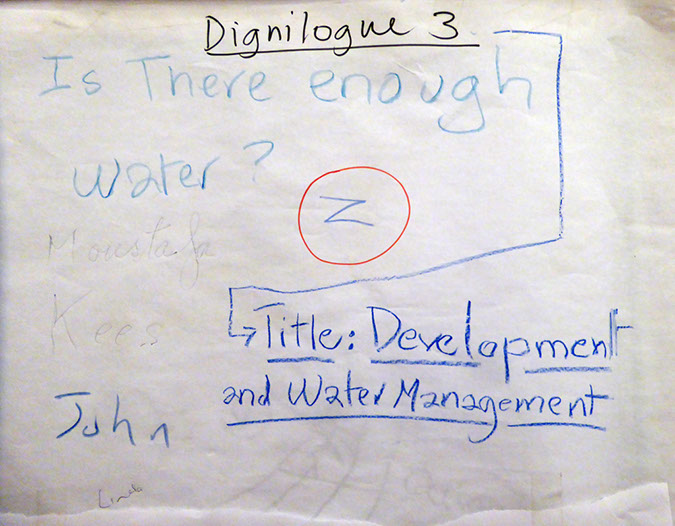


• Please click here to see the pictures taken by Noha Hussein during Day Two
• Please click here to see the programme for the entire conference that we created together on Day One, and the Dignilogue posters'Message to the World' for the World Dignity University (WDU) Initiative, Zaynab El Bernoussi and Linda Kabaira (Video)
• Dignilogue 4, Day Two: Making Dignity Global and Sustainable by Ute Meinert and Kees Hulsman



• Please click here to see the pictures taken by Noha Hussein during Day Two
• Please click here to see the programme for the entire conference that we created together on Day One, and the Dignilogue posters'Message to the World' for the World Dignity University (WDU) Initiative, Ute Meinert and Kees Hulsman (Video)
• Visit to the memorial of Ibrahim Abouleish


• Please click here to see more photos of the visit to the memorial of Ibrahim Abouleish
• Evening gathering


• Please click here to see more photos of the evening gathering
End of Day Two
Day Three of the Workshop part of the conference, Sunday, 23rd September 2018
Location: SEKEM Farm - 40 Years of Sustainable Development, Ecovillage, Belbeis, Ard El-Katiba, Galvina - SEKEM, El Sharkia (1 hour from Cairo airport)

Still photos of Day Three
• Please click here to see the pictures taken by Evelin Lindner
• Please click here to see the pictures taken by Lisbeth Glad
• Please click here to see the pictures taken by Noha Hussein
All of the conference
• Please click here to see the venues of this conference
• Please click here to see the programme for the entire conference that we created together on Day One, and the Dignilogue posters
• Please click here to see a collection of portrait photos
• Please click here to see photos of Helmy Abouleish
• Please click here to see photos of Evelin Lindner
Welcome

Continuation of Dignilogue sessions
• 8.00 School Circle: The children of SEKEM sing Biladi ('My Homeland')
• Tour of the Sekem Ecovillage (two hours)
• Dignilogue 5, Day Three: Human Dignity As 'Soil for Life' by Narimeh Paeplow and Maya von Maltzan
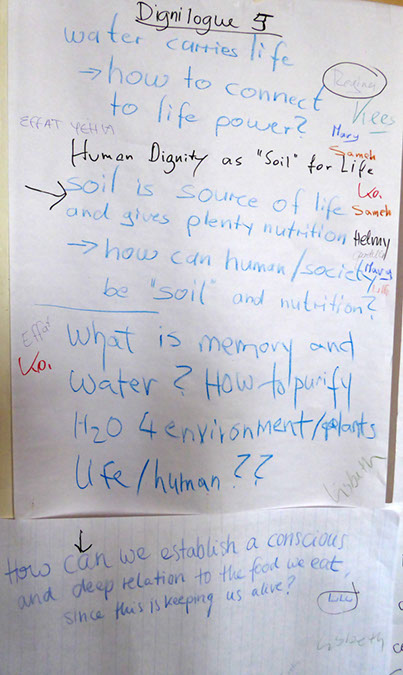


• Please click here to see the programme for the entire conference that we created together on Day One, and the Dignilogue posters
• Please click here to see the pictures taken by Evelin Lindner'Message to the World' for the World Dignity University (WDU) Initiative, Linda Kabaira (for Narimeh Paeplow) and Maya von Maltzan (Video)
• Development of a MSc programme in Climate Change, Sustainable Agriculture and Food Security (two hours)

• Please click here to see the pictures taken by Noha HusseinMohammed Anwar, of the Centre of Education for Sustainable Development at Heliopolis University, shared the CCSAFS project as a model of master programs that provides plans for sustainable future and human dignity. CCSAFS is a European Commission ERASMUS plus Capacity Building in Higher Education (CBHE) funded project (573881-EPP-1-2016-1-EL-EPPKA2-CBHE-JP) entitled “Development of a MSc programme in Climate Change, Sustainable Agriculture and Food Security” that is being designed and implemented at the Suez Canal University in Egypt and Jerash Private University in Jordan. The CCSAFS project is coordinated by Prof. Dr. Vassilios Makrakis, at the University of Crete, Greece, UNESCO Chairholder ICT in Education for Sustainable Development.
• A little evening gathering
• Please click here to see the pictures taken by Lisbeth Glad
End of Day Three
Public Event 'Climate Change, Sustainable Agriculture, and Food Security in Relation to Human Dignity'
Location: Ibn Rushd Hall, Heliopolis University for Sustainability, 3 Cairo Belbeis Desert Road, El-Nahda, El Salam City/Qism El-Salam, Heliopolis, Cairo (20 minutes from Cairo airport, for google map search, just enter Heliopolis University)

Still photos Day Four
• Please click here to see the pictures taken by Sameh Khouzam of a tour through Heliopolis University
• Please click here to see the pictures taken by Lisbeth Glad
• Please click here to see the pictures taken by Narimeh Paeplow
• Please click here to see the pictures taken by Sameh Khouzam
Still photos of all of the conference
• Please click here to see the venues of this conference
• Please click here to see the programme for the entire conference that we created together on Day One, and the Dignilogue posters
• Please click here to see a collection of portrait photos
• Please click here to see photos of Helmy Abouleish
• Please click here to see photos of Evelin Lindner
• 9:30 – 10:00 Welcome and visit to the 'arts exhibition and experience'
• 10:00 – 10:15 Opening and Welcome Address, Helmy Abouleish (Chair of the Board of Trustees, Heliopolis University)
See the SEKEM Vision and Mission 2057: 1977 – 2017 – 2057

• Please click here to see the pictures taken by Narimeh Paeplow
• Honouring Helmy Abouleish, Ragnhild Nilsen, Regina Hanel, Lisbeth Glad, Gerdelin Bodvin, Mary Bakhoum and Sameh Khouzam with the Beacon of Dignity Award (Mary Bakhoum and Sameh Khouzam received their award on 27th September)

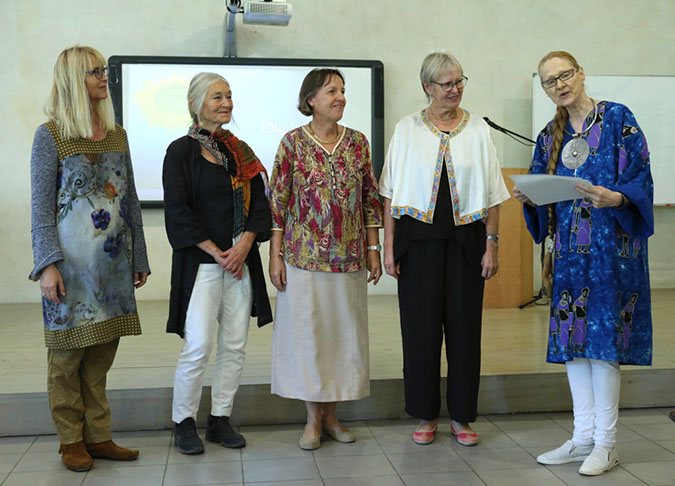

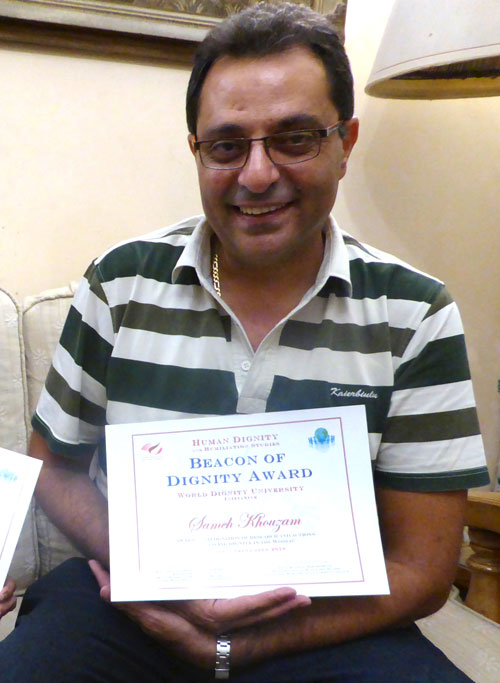
• Please click here to see the pictures taken by Narimeh Paeplow
• 10:15 – 10:30 Welcome Address, Ragnhild Nilsen (SEKEM Scandinavia) and Evelin Lindner (World Dignity University Initiative)


• Please click here to see the pictures taken by Narimeh Paeplow
• Please click here to see the pictures taken by Lisbeth Glad
• 10:30 – 10:45 Introduction to the Open Space Methodology, Mohamed Anwar, Centre of Education for Sustainable Development, Heliopolis University

• Please click here to see the pictures taken by Narimeh Paeplow
• Please click here to see the pictures taken by Lisbeth Glad
• 10:45 – 11:30 Open Space Process, facilitated by Dr. Omar Ramzy, Director of Centre of Education for Sustainable Development, Heliopolis University

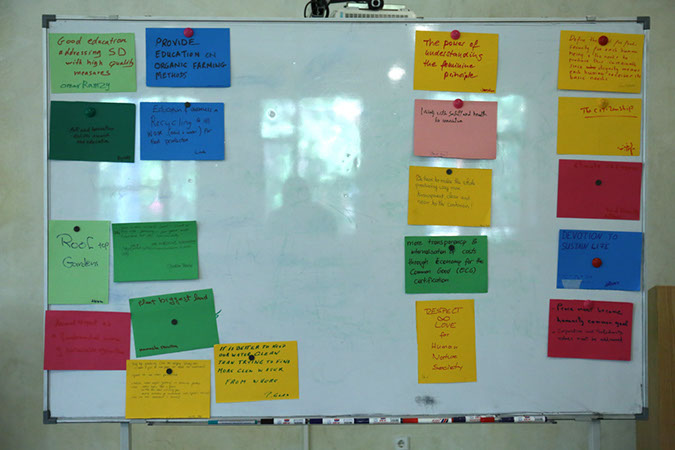



• Please click here to see the pictures taken by Narimeh Paeplow
• Please click here to see the pictures taken by Lisbeth Glad
• 11:30 – 13:00 Outbreak groups gathered
• 13:00 –14:00 Lunch


• Please click here to see the pictures taken by Lisbeth Glad
• 14:00 - 15.30 Active interaction and group presentations




• Please click here to see the pictures taken by Narimeh Paeplow
• Please click here to see the pictures taken by Lisbeth Glad


• Please click here to see the pictures taken by Sameh Khouzam


• Please click here to see the pictures taken by Lisbeth Glad
Closing of the Event
Message of support from René Wadlow, President of the Association of World Citizens
Dear Colleagues, I wish to send best wishes for your important conference. I can be with you only in Spirit. Thus I send a short message of best wishes for your conference:
On behalf of the Association of World Citizens, we wish to send you our best wishes for your annual conference devoted to Strategies for a Sustainable Future with an emphasis on Agriculture and Water.
Within the framework of the United Nations 2030 Sustainable Development Goals, the Association of World Citizens has stressed that at the level of the individual, the community, the State and the emerging world society, there is a need to take firm action to formulate effective responses to ecological challenges. We need to safeguard the delicate balance of the natural environment and to develop the world's resources for the common good. Ecologically-sound development requires a new orientation of ethical, moral and spiritual values. Concepts of caring, respect, sharing and cooperation with others must be at the center of the values of living in harmony with Nature.
Water is a major focus of your meetings. Water has often been used in many cultures as a powerful symbol, an element that purifies and that heals. Thus, it is a symbol of both action and stillness - the need to find stillness in the midst of action, of peace in the midst of creativity. As the US author Henry Miller has said "The waters of the Earth! Next to light, the most mysterious element of creation. Everything fades away in time. The waters abide."
The Association of World Citizens is particularly concerned with Trans-frontier River Systems such as the Mekong where new forms of cooperation for water use among China, Laos; Cambodia and Vietnam is necessary. The same holds true for the States which share the Nile River Basin. The Nile Basin has an increasing population. A fall in per capita water availability coupled with this rapid population growth could leave riparian countries facing drought and possible famines as we have seen in Ethiopia. Thus, we look to your meetings to deal in a creative way with these trans-frontier river issues.
With all best wishes for the success of your meetings.
Jenn Zen Chong, Secretary for Ecologically-sound Development
Rene Wadlow, President, Association of World Citizens
7th September 2018
List of Participants
• Ragnhild Nilsen, SEKEM Scandinavia, inspirer and host of this conference
• Evelin Lindner, founding president, HumanDHS, host of this conference
• Regina Hanel, SEKEM Egypt, host of this conference
• Konstanze and Helmy Abouleish, SEKEM Egypt, host of this conference
Mr. Helmy Abouleish (*1961) is serving as Chair of the Board and Managing Director of SEKEM. He is member of the Board of the German-Arab Chamber of Commerce, member of the Board of Trustees of the Egyptian Junior Business Association. Helmy Abouleish is also a member of the International Federation of Organic Agriculture Movements (IFOAM), the World Future Council, the International DEMETER Organization (IDO) and Social Entrepreneur Council (Schwab Foundation).
Ms. Konstanze E. Abouleish (*1963), born in Germany, grew up in Greece and moved to Egypt in 1976. Since then, with one year interruption for final education, living in Egypt, being involved in SEKEM since 1982. Since then, she has been in SEKEMs developments, in particular in the educational initiatives, and cultural activities, as well, as in NatureTex. She is Managing Director of NatureTex and Member of SEKEMs Future Council.
See the SEKEM Vision and Mission 2057: 1977 – 2017 – 2057.
See also
Konstanze Abouleish's "Message to the World" (Video | Video recorded on November 16, 2021), contribution to the 2021 Workshop on Transforming Humiliation and Violent Conflict, Virtual at Columbia University, New York City, December 9 – 11, 2021.



• See also: Konstanze Abouleish and Evelin Lindner presented each other (Video)
• Mohammed Anwar, SEKEM Egypt
Heliopolis University Head Office, Centre of Education for Sustainable Development, Heliopolis University, under Dr. Omar Ramzy, Director of Centre of Education for Sustainable Development, hosts of this conference
• Noha Hussein, SEKEM Egypt
SEKKEM, Public Relations Specialist, host of this conference
• Dorothea Walter, SEKEM Egypt
• Martina Dinkel, SEKEM Egypt
• Andreas Kalbhenn, SEKEM Egypt
• John A. Shoup
John A. Shoup is a Full Professor of Anthropology has his BA and MA in Middle Eastern Studies/Arabic from the University of Utah and his PhD in Cultural Anthropology from Washington University in St. Louis. He has conducted field work in Lesotho, Jordan, Syria, Egypt, Tunisia, Morocco, and most recently in Mauritania on topics related to pastoralism, impact of tourism on local communities, traditional land use systems, and popular culture. He has authored and co-authored several articles and book chapters and published Culture and Customs of Jordan (2007), Culture and Customs of Syria (2008) and co-authored Saudi Arabia and Gulf Arab States Today: An Encyclopedia of Life the Arab States (2009), and Ethnicities in the Middle East and Africa (2012). He was part of research team for the Baseline Survey conducted in the Middle Atlas region of Ifrane (2000) and on the impact of tourism in Atlantic port city of Essaouira (2001- 2002) published as Assessing Tourism in Essaouira by Al Akhawayn University (2002). John Shoup taught at the American University in Cairo from 1990 to 1996 and at Al Akhawayn University in Ifrane, Morocco from 1996 to the present.
- The INDH (National Initiative for Human Dedvelopment) as Another Example of Participation in Development, 2018
Paper presented for the 31st Annual Conference of Human Dignity and Humiliation Studies 'Dignity and Innovation - Strategies for a Sustainable Future, with a Special Focus on Agriculture and Water’, in Cairo, Egypt, 21st – 24th September 2018.
See for his publications, among others:
Shoup, John A. (2007). Culture and customs of Jordan. Westport, CT: Greenwood Press.
Shoup, John A. (2008). Culture and customs of Syria. Westport, CT: Greenwood Press.
Shoup, John A. (2011). Ethnic groups of Africa and the Middle East: An encyclopedia. Santa Barbara, CA: ABC-CLIO, 2011.
Shoup, John A. (2017). The Nile: An encyclopedia of geography, history, and culture. Santa Barbara, CA: ABC-CLIO, 2017.
Maisel, Sebastian, and John A. Shoup (2009). Saudi Arabia and the Gulf Arab states today: An encyclopedia of life in the Arab states. Westport, CT: Greenwood Press.
• Zaynab El Bernoussi, Morocco
Dr. Zaynab El Bernoussi is a professor of international studies at the School of Humanities and Social Sciences at Al Akhawayn University and a member of the Hillary Clinton Center for Women's Empowerment (HCC). She holds a PhD in political and social Sciences from the Université Catholique de Louvain. See her Appreciative Introduction.
- Global Dignity? Implications for Paradigms of International Development and Globalisation (2018)
See also:
- Can Dignity Become a Constitutional Right? (Pdf | Video of Introduction | Video of Dignilogue Preparations | Lifestreaming by Bhante Revata Chipamong Chowdhury | Video of Summary) 2017
• Lisbeth Vilkan Glad and Per Glad, Norway
Liesbeth Glad has founded International Art for Understanding (IAU) to increase understanding and confidence between people of all races, based on her belief that this goal can be reached through the medium of art, by international paintings demonstrating how similar our basic needs are, such as for food and lodging, hope for liberty, and longing for peace.
• Gerdelin Bodvin, Norway
• Mary Bakhoum and her son Sameh Khouzam, Cairo
• Kees Hulsman, Holland, Center for Intercultural Dialogue and Translation in Maadi, Cairo
• Effat Yehia, faculty of Heliopolis University
• Ute Meinert, Cairo
• Narimeh Paeplow, Germany, Intern, SEKEM Egypt
• Linda Kabaira, Zimbabwe, doctoral studend, Intern, SEKEM Egypt
• Maya von Maltzan, Germany, Intern, SEKEM Egypt
• Tanja Sophia Rüter, Germany, Intern, SEKEM Egypt
• Moustafa Hedayah, Aqua Egypt, Cairo
• Muhammad Swefy (aka Mo Swift), Fahd AbdEl Aziz, and Hassan Mahran, Cairo
• Hesham Sayed, Cairo
These participants were unfortunately hindered to participate:
• Mohammad Abul Kalam Azad
Mohammad Abul Kalam Azad is Assistant Professor in General Education and Assistant Adviser for Student's Welfare at Manrat International University in Bangladesh. He has completed his M.A. degree in Peace Education at the United Nations mandated University for Peace. Md. Azad has another Master’s degree in Islamic Studies from the University of Dhaka, Bangladesh. He worked as a Research Assistant for USAID where his research topic was 'Pre-primary and Primary Madrasah Education in Bangladesh'.
Please see:
-Peace and Stability in Bangladesh through Charity, Sustainable Development and Peace Education in Bangladesh, San Jose, Costa Rica: United Nations-mandated University for Peace, Project Development Report, 2006.
- Sustainable Development in Bangladesh: Problem and Prospects, paper presented at the 23rd Annual Conference of Human Dignity and Humiliation Studies 'Returning Dignity', in Chiang Mai, Northern Thailand, 8th - 12th March 2014.
• Mamta Siwakoti, Kathmandu School of Law, Nepal, and Manish Siwakoti
• Ikram Nosshi and Suzanne, Cairo
• Mansoureh Sharifzadeh, Teheran
• Manfred Prinz
Prof. Dr. Manfred Prinz is working in the field of Cultural Studies and Intercultural Learning, at the Institut für Romanistik der Justus-Liebig-Universität Gießen.
• Khaled Fattah
In addition to a number of post graduate studies in the fields of intercultural communication, cultural psychology and development studies, Dr. Fattah holds a PhD in international relations from the University of St Andrews in the UK. His forthcoming academic works are entitled 'Political Modernization in Tribal Middle Eastern Societies' and 'Tribes and Revolutions in the Middle East'.
• Alicia Cabezudo
Alicia Cabezudo is a
Professor and Peace / Human Rights Educator and Consultant. Until recently, she was the Director of Educating Cities Latin America (International Relations Bureau, Municipality of Rosario, Argentina). The issue of humiliation is of deep concern to her because of the sufferings in the Latin-American region through dictatorship and torture. [read more]
- Profesora Alicia Cabezudo Escuela de Ciencias de la Educación Universidad Nacional de Rosario - UNR Rosario / Argentina
- International Peace Bureau - IPB Berlin
Furthermore:
• Gamal Amer, Cairo
• Maha Nour El-Deen, Heliopolis University
• Youssry Mohamed El-Sawy Ibrahim, Heliopolis University for Sustainability
• Farida Fahmy, Heliopolis University for Sustainability
• Hamada, Heliopolis University for Sustainability
• Shindy, Heliopolis University for Sustainability
• Emad, Heliopolis University for Sustainability
• Maissa, Heliopolis University for Sustainability
• Amina Taitoon, Intern, Sekem
• Danya Nadar, Cairo
• Maria Hunskaar
• Bahia Shehab, Associate Professor of Design Department of the Arts, American University in Cairo
• Nagla Samir, Associate Professor of Design Department of the Arts, American University in Cairo
• Yasser Sabry, Student of graphic design, American University in Cairo
• Sherry Narodick, mediator, New York
• Camilla Ainley, Siwa Oasis, Egypt
• Kari von Hafenbredl, Rotary, Norway
• Lasse Moer, University of Oslo, papirfly session
• Dadarao C. Kirtiraj, associate professor,
Bharti Vidyapeeth Deemed University,
Social Sciences Centre, Pune, India
• Tejas Kumar Jain, secretary general of the Indore World Summit 2018, Indore, Madhya Pradesh, India
• Menika Soni Jadon, Rennaissaince College, Indore, Madhya Pradesh, India, with Sonali Dudey
• Ravi Ranjan, faculty at Zakir Husain Delhi College, University of Delhi, just completed his doctoral thesis at Delhi University on Conceptualising Human Dignity: A Theoretical Perspective
• Luyolo Sijake, South Africa and China
Papers
All participants are warmly invited to send in papers.
Please notify us, if you wish to submit any of your papers also as a book chapter or as a journal article.
Please see earlier submitted papers here:
• List of All Publications
El Bernoussi, Zaynab (2018)
Global Dignity? Implications for Paradigms of International Development and Globalisation
Paper presented at the 31st Annual Conference of Human Dignity and Humiliation Studies 'Dignity and Innovation - Strategies for a Sustainable Future, with a Special Focus on Agriculture and Water’, in Cairo, Egypt, 21st – 24th September 2018.
Shoup, John A. (2018)
The INDH (National Initiative for Human Dedvelopment) as Another Example of Participation in Development
Paper presented at the 31st Annual Conference of Human Dignity and Humiliation Studies 'Dignity and Innovation - Strategies for a Sustainable Future, with a Special Focus on Agriculture and Water’, in Cairo, Egypt, 21st – 24th September 2018.
Background material
• Terrence Deacon: Climate Change - From Self-Reinforcing Growth to Self-Regulating Sustainability, lecture at the University of Oslo, 29th January 2018: 'There is broad consensus that the climate crisis has to do with global growth in population and material consumption. But do we really understand how deeply self-reinforcing these growth processes are?' Thank you, dear Lasse Moer, for sharing!
• Water resources management in modern Egypt, Wikipedia english / arabic
• Wehling, Philine (2018). Wasserrechte am Nil: Der Einfluss des internationalen Wasserrechts auf die Entwicklung eines Vertragsregimes zur Nutzungsverteilung und gemeinsamen Wasserwirtschaft am Beispiel des Nils. Heidelberg: Springer.
• Ägyptens Lebensader, Österreichischer Rundfunk (ORF, English: Austrian Broadcasting Corporation) is the Austrian national public service broadcaster.
• 'Tobacco control, a ‘major component’ of environmental protection efforts – UN health official', United Nations News, 4th September 2018: 'From deforestation to soil degradation and pollution, tobacco production and its use by consumers, is “tremendously destructive” for the environment, although control measures can help curb its negative environmental effects, including the damaging impact of climate change, the head of the UN tobacco control treaty watchdog – formally known as the Secretariat of the WHO FCTC – has told UN News.
• 'How to Solve the Water Challenges in the Middle East and North Africa, the World’s Most Water-Scarce Region', Food and Agriculture Organization of the United Nations (FAO), 30th August 2018.
• 'Omar Robert Hamilton: "We Won’t Know What the Result of the Egyptian Revolution Is for a Very Long Time",' by Claire Armitstead, The Guardian, 24th August 2017. See his book: Hamilton, Omar Robert (2017). The City Always Wins: A Novel. New York: MCD.
• El Bernoussi, Zaynab (2014). 'The postcolonial politics of dignity: From the 1956 Suez nationalization to the 2011 Revolution in Egypt', In International Sociology, 30 (4), 367–82. doi: 10.1177/0268580914537848: '...as Middle Eastern bibliographer Derek Hopwood explained: for Egyptians, the period of British rule was a time of ‘humiliation, a negation of dignity’ (Hopwood, Derek, 1982, Egypt: Politics and society 1945-1981. London: Allen and Unwin, page 12). Furthermore, that feeling of humiliation was further exacerbated by a foreign dictatorship, which in this case was the Muhammad Ali dynasty'. ...
'When looking retrospectively at the 1956 and 2011 events in Egypt, there exists a certain recurrent discourse of dignity and even ambivalence in dignity: material dignity (e.g. obtaining a job), cultural dignity (e.g. respect for a father figure), and a certain "spiritual" dignity (e.g. "planting the seeds of dignity within the souls of the citizens")'.
• 'SDG 6: Availability and Sustainable Management of Water and Sanitation for All', by SEKEM, 5th January 2018: Water is a fundamental element for life. Certainly, having access to clean water sources is a human right. By 2025, 1.8 billion people around the world are expected to live in absolute water scarcity. Not only the climate change stands behind the rise of such challenge, also irrational consumption of the available water resources and shortage of sustainable techniques are reasons. With water scarcity, further problems, such as poor sanitation, arise. Almost 40% of the world’s population does not have access to improved sanitation, which leads to poor hygienic conditions, and hence the prevalence of infectious diseases. In Egypt, where the Nile river is the only source of fresh water, there are around 800,000 people who do not have good access to clean water and sewage networks. In poor areas in Upper Egypt, the absence of clean water sources is especially dramatic. People get their water from narrow river channels, which are mostly contaminated. Sprinkling Irrigation 85% of Egypt’s water resources are used for agricultural activities, and 90% of this by conventional agriculture. The agricultural wastewater, carrying the residuals of chemical fertilizers and pesticides is drained back to the Nile – a vicious cycle.
• 'The River Nile – A Salty Affair', by Thomas Obersteiner, Global View, 2009: 'Facing a growing population and the Nile showing signs of over-exploitation, Egypt ought to ask how much burden can be placed on the „holy river“'.
• New music style in Egypt
• Raskin, Paul (2016). Journey to Earthland: The Great Transition to Planetary Civilization. Boston: Tellus Institute.


